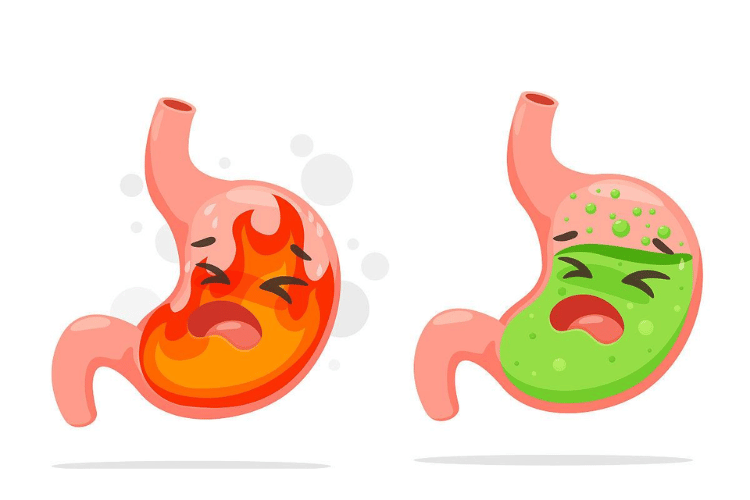
Acid reflux is more than just an uncomfortable burning sensation in your chest. For some, it can escalate into a nighttime hazard, leaving them gasping for air with acid burning their throat. This severe occurrence of reflux during sleep can lead to choking and, in rare cases, life-threatening complications. Understanding why this happens, who it affects, and how to prevent it is crucial for anyone suffering from reflux symptoms.
This article examines acid reflux and nighttime choking, the underlying mechanisms, associated risks, and actionable steps to protect yourself or a loved one.
What is Acid Reflux and GERD?
To fully understand the dangers of nighttime choking, we need to begin with the basics of acid reflux and GERD.
What is Acid Reflux?
Acid reflux occurs when stomach acid flows back into the esophagus, causing irritation and discomfort. This happens because the lower esophageal sphincter (LES), a muscle that usually prevents acid from escaping, becomes weak or fails to close correctly.
Symptoms of Acid Reflux
- A burning sensation in the chest (commonly known as heartburn).
- Regurgitation of sour or bitter fluid into the throat or mouth.
- Difficulty swallowing.
- A persistent dry cough or sore throat.
- An ongoing sour taste in the mouth.
What is GERD?
Gastroesophageal reflux disease (GERD) is a more severe and chronic form of acid reflux. GERD symptoms occur frequently, often multiple times per week, and can cause damage to the esophagus.
Key Differences Between Acid Reflux and GERD:
- Acid Reflux is occasional and usually triggered by certain foods or eating habits.
- GERD is a long-term condition that can result in complications like esophagitis, strictures, or even Barrett’s esophagus, a precursor to esophageal cancer.
However, both conditions can worsen during sleep due to the effects of gravity and positioning.

What is Acid Reflux
How Does Acid Reflux Affect Sleep?
Nighttime acid reflux is uncomfortable and can interfere significantly with sleep quality. When lying down, stomach acid makes traveling upward into the esophagus easier. This disrupts natural processes in several ways:
- Reduction in Gravity: During the day, gravity helps keep acid in the stomach. Lying flat negates this effect.
- Relaxation of the LES: During sleep, the lower esophageal sphincter may become more relaxed, allowing acid to escape.
- Slow Swallowing Reflex: Swallowing frequency decreases at night, which means acid that enters the esophagus is cleared less often.
Why Does Choking Occur in Sleep?
Choking during sleep may happen when stomach acid escapes beyond the esophagus into the throat or airways. This can cause reflexive coughing or even laryngospasms (temporary closure of the vocal cords), cutting off airflow.
Severe occurrences might see stomach acid entering the lungs, leading to aspiration and potentially severe complications like pneumonia or acute respiratory distress.
How Acid Reflux Can Lead to Choking and Death
Though rare, choking on reflux during sleep can have grave consequences if not appropriately managed.
Mechanics of Nighttime Aspiration
- Pulmonary Aspiration occurs when refluxed acid enters the lungs, causing inflammation or bacterial infections like aspiration pneumonia.
- Laryngospasm: The vocal cords close reflexively to prevent acid from entering the windpipe, but, in doing so, block your ability to breathe. This can lead to suffocation, especially if the vocal cords remain closed for an extended time.
Documented Severe Cases
Medical literature contains instances where severe nighttime reflux contributed to asphyxiation or rapid respiratory decline. Specific vulnerable populations, including elderly individuals, infants, and those with pre-existing respiratory problems, are particularly at risk.
High-Risk Factors for Nighttime Choking
Specific individuals are predisposed to severe acid reflux and the risks associated with it. Factors with higher risk include:
- Chronic GERD: Frequent reflux episodes weaken the LES and increase inflammation risks.
- Obstructive Sleep Apnea: The strain of interrupted breathing patterns exacerbates acid reflux.
- Use of Sedatives or Alcohol: Both substances relax the LES and throat muscles, making reflux more likely.
- Obesity: Excess abdominal pressure pushes acid upward.
- Neurological Disorders: Conditions like Parkinson’s or stroke impair swallowing and airway reflexes, making reflux worse.
Practical Tips to Prevent Nighttime Choking
Addressing the root cause of reflux is key to mitigating risks. Here are strategies for minimizing nighttime reflux and preventing choking:
1. Adjust Sleep Position
- Elevate your upper body using a wedge pillow or by raising the bed’s head by 6–8 inches. This positioning uses gravity to keep acid in the stomach.
- Sleep on your left side; this position aligns the stomach and esophagus, reducing reflux. Avoid sleeping on your right side or back, which can worsen symptoms.

Adjust Sleep Position
2. Dietary Adjustments
- Avoid Late-Night Meals: Stop eating 3–4 hours before bedtime to allow your stomach to empty before lying down.
- Identify Trigger Foods: Common triggers include spicy foods, high-fat meals, citrus fruits, caffeine, and alcohol. Reducing these items can make a big difference.
- Small, Frequent Meals: Eating smaller portions throughout the day eases pressure in the stomach.
3. Lifestyle Changes
- Maintain a Healthy Weight: Extra abdominal fat exerts pressure on the stomach, increasing reflux risk.
- Quit Smoking: Smoking weakens the LES, increasing acid reflux occurrences.
- Wear Loose Clothing: Tight clothing around your abdomen can worsen reflux symptoms.
4. Medical Interventions
- Over-the-Counter Medications: Options like antacids, H2 blockers, and proton pump inhibitors (PPIs) can decrease stomach acid production.
- Sleep Apnea Treatment: Using a CPAP machine can significantly improve outcomes if reflux is tied to apnea.
- Surgical Options: For severe GERD, consider a fundoplication procedure to strengthen the LES.
When to Seek Medical Attention
While mild reflux can often be managed at home, specific symptoms warrant professional evaluation.
Seek immediate care if you experience:
- Persistent or worsening choking episodes.
- Difficulty swallowing or a sensation of food stuck in your throat.
- Unexplained weight loss or malnutrition.
- Signs of aspiration pneumonia, such as fever, shortness of breath, or chest pain.
A sleep study or esophageal pH monitoring may also be recommended to diagnose GERD severity and associated complications accurately.
Frequently Asked Questions
Q: What is the relationship between acid reflux or GERD and choking in your sleep?
A: Acid reflux, also known as gastroesophageal reflux disease (GERD), can lead to choking in your sleep when stomach acid flows back into the esophagus, causing irritation and a reflexive gasp or cough. This may occur if the lower esophageal sphincter is weakened or relaxed at night.
Q: What are the typical acid reflux symptoms that may disrupt sleep?
A: Common symptoms of acid reflux that can disrupt sleep include heartburn, regurgitation of stomach acid, difficulty swallowing, and a sensation of choking or gasping in sleep. These symptoms can lead to poor sleep quality and require lifestyle adjustments or medical intervention.
Q: Can I die from choking on acid reflux while I sleep?
A: While it is rare, choking on acid reflux can lead to severe health conditions, including aspiration pneumonia, which can be life-threatening. It is crucial to manage severe symptoms of acid reflux or GERD to minimize the risk of choking in your sleep.
Q: How can I reduce the likelihood of waking up choking due to acid reflux?
A: To reduce the likelihood of waking up choking, it is advisable to sleep on your left side, maintain an incline with pillows, and avoid heavy meals or certain foods before bedtime. These strategies can help minimize the occurrence of stomach acid flowing back into the esophagus during the night.
Q: What health conditions may increase the risk of choking in your sleep due to acid reflux?
A: Health conditions such as obesity, obstructive sleep apnoea, and chronic acid reflux can increase the risk of choking in your sleep. These conditions may exacerbate the symptoms of acid reflux and should be discussed with a healthcare provider for appropriate management.
Q: What are some safe sleeping tips for individuals with acid reflux or GERD?
A: Safe sleeping tips for those with acid reflux or GERD include elevating the head of the bed, avoiding eating within three hours of bedtime, and wearing loose-fitting clothing while sleeping. These practices can help you sleep better and reduce nighttime acid reflux episodes.
Q: How can I determine if my choking in sleep is related to acid reflux?
A: If you experience frequent choking episodes, gasping in sleep, or other acid reflux symptoms, it may be beneficial to undergo a sleep study or consult a healthcare professional. They can evaluate your symptoms and determine if they are related to acid reflux or GERD.
Q: What should I do if I experience choking on acid reflux symptoms during the night?
A: If you experience choking on acid reflux symptoms during the night, it is essential to sit up to allow gravity to help clear the esophagus. Drinking water may also help alleviate the sensation. If this occurs frequently, consult a healthcare provider for further evaluation and management options.
Final Thoughts
Nighttime choking on acid reflux is not just a frightening experience but also a sign of underlying health issues that need attention. You can reclaim restful, safe sleep by understanding high-risk factors and adopting preventive measures—from changing sleep positions to managing GERD with medications.
Don’t ignore persistent symptoms. If reflux disrupts your life or sleep patterns, consult a healthcare provider for a tailored treatment plan. Proactive care today can prevent severe complications tomorrow.








 Login with Google
Login with Google Login with Facebook
Login with Facebook